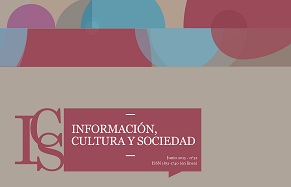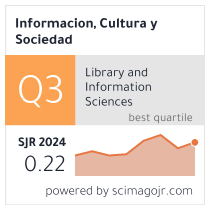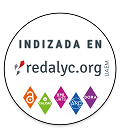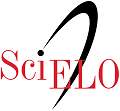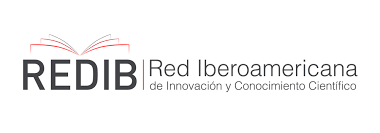A A fine stitch: Archives, information, mediation
Abstract
The reflections presented here are framed within the challenges related to access to archives, based on the premise that access not only involves making the archives available and searchable through technological resources, but also understanding their origin and production context. In this sense, access becomes a process of mediation, which implies a complex negotiation between the expectations of users and the specialized knowledge that archival science can provide. Given that users have very diverse profiles in terms of experience, education, and information needs, archival mediation can only be carried out if the profile of the institutions that safeguard the documentary heritage, the nature of their holdings, and above all, the specificity of archival documents are understood.Downloads
References
Bellotto, Heloísa Liberalli. 2006. Arquivos permanentes: tratamento documental. Rio de Janeiro: Ed. FGV.
Bellotto, Heloísa Liberalli. 2014. Da gênese à função: o documento de arquivo como informação e testemunho. En Arquivo: estudos e reflexões. Belo Horizonte: Ed. UFMG. p. 329-344.
Bellotto, Heloísa Liberalli. 2018. Concepto de especie documental como antecedente al tipo en la teoría archivística. En Boletín ANABAD. Vol. 68, no. 3-4, 446-455.
Camargo, Ana Maria de Almeida. 2003. Sobre o valor histórico dos documentos. En Arquivo Rio Claro. No. 1, 11-17.
Camargo, Ana Maria de Almeida. 2015. Sobre espécies e tipos documentais. En Camargo, Ana Maria de Almeida et al. Dar nome aos documentos: da teoria à prática. São Paulo: Instituto Fernando Henrique Cardoso. p. 14-30.
Camargo, Ana Maria de Almeida. 2018. Historiadores e arquivistas: um diálogo possível. En Revista do Instituto Histórico e Geográfico de Sergipe. Vol. 1, no. 48, 23-26.
Camargo, Ana Maria de Almeida y Heloísa Liberalli Bellotto, coord. 2012. Dicionário de terminologia arquivística. São Paulo: Associação de Arquivistas de São Paulo.
Camargo, Ana Maria de Almeida y Silvana Goulart. 2015. Centros de memória: uma proposta de definição. São Paulo: Sesc Edições.
Campos, José Francisco Guelfi. 2018. Recortes de jornal: da prática social aos arquivos. São Paulo: Universidade de São Paulo, 2018. 398 p. Tesis de doctorado.
Carucci, Paola. 1983. Le fonti archivistiche: ordinamento e conservazione. Roma: La Nuova Italia Scientifica.
Conselho Nacional de Arquivos. Brasil. 2014. Criação e desenvolvimento de arquivos públicos municipais: transparência e acesso à informação para o exercício da cidadania. Rio de Janeiro: Arquivo Nacional.
Cook, Terry. 1990. Viewing the world upside down: reflections on the theoretical underpinnings of archival public programming. En Archivaria. No. 31, 123-134. <https://archivaria.ca/index.php/archivaria/article/view/11725> [Consulta: 26 febrero 2023].
Cruz Mundet, José Ramón. 2011. Diccionario de archivística. Barcelona: Alianza.
Delmas, Bruno. 1996. Manifeste pour une diplomatique contemporaine. Des documents institutionnels à l’information organisée. En La Gazette des Archives. No. 172, 49-70.
Duff, Wendy M. 2010. Archival Mediation. En Eastwood, Terry y Heather MacNeil, ed. Currents of Archival Thinking. Santa Barbara, CA: Libraries Unlimited. p. 115-136.
Duranti, Luciana. 1997. The Archival Bond. En Archives and Museum Informatics. Vol. 11, no. 3, 213-218.
Duranti, Luciana. 2015. Archival Bond. En Duranti, Luciana y Patricia C. Franks, ed. Encyclopedia of Archival Science. Lanham, MD: Rowman & Littlefield. p. 28-29.
Freeman, Elsie T. 1984. In the eye of the beholder: archives administration from the user’s point of view. En American Archivist. Vol. 47, no. 2, 111-123. <https://doi.org/10.17723/aarc.47.2.a373340078502136>
Heredia Herrera, Antonia. 2007. ¿Qué es un archivo? Madrid: Trea.
Heredia Herrera, Antonia. 2015. El principio de procedencia y los otros principios de la archivística. En Andrade, Ana Célia Navarro de, ed. Archivos y documentos: textos seminales. São Paulo: Associação de Arquivistas de São Paulo. p. 43-56.
Jenkinson, Hilary, Sir. 1937. A manual of archive administration. London: Humphries.
Jimerson, Randall C. 1989. Redefining archival identity: meeting user needs in the information society. En American Archivist. Vol. 52, no. 3, 332-340. <https://doi.org/10.17723/aarc.52.3.k4532462540117t7>
Lodolini, Elio. 1993. Archivística: principios y problemas. Madrid: ANABAD.
Lopez, André Porto Ancona. 2002. Como descrever documentos de arquivo: elaboração de instrumentos de pesquisa. São Paulo: Imprensa Oficial.
Menne-Haritz, Angelika. 1998. What can be achieved with archives? En The concept of record: report from the Second Stockholm Conference on Archival Science and the Concept of Record. Stockholm: Riksarkivet. p. 11-24.
Menne-Haritz, Angelika. 2001. Access – the reformulation of an archival paradigm. En Archival Science. Vol. 1, no. 1, 57-81. <https://doi.org/10.1007/BF02435639>
Rocha, Eliane Cristina de Freitas. 2018. Usuários e públicos nas práticas de profissionais da informação e áreas correlatas. En Biblionline. Vol. 14, no. 4, 65-82. <https://doi.org/10.22478/ufpb.1809-4775.2018v14n4.43347>
Rocha, Eliane Cristina de Freitas e Ivana Denise Parrela. 2020. Com a palavra o usuário: o que dizem os usuários do Arquivo Nacional sobre suas pesquisas na instituição. En Acervo. Vol. 33, no. 3, 227-238. <https://revista.an.gov.br/index.php/revistaacervo/article/view/1614> [Consulta: 26 febrero 2023].
Rodríguez Bravo, Blanca. 2002. El documento entre la tradición y la renovación. Madrid: Trea.
Tessitore, Viviane. 1989. Arranjo: estrutura ou função? En Arquivo: Boletim Histórico e Informativo. Vol. 10, no. 1, 19-28.
Tessitore, Viviane. 2017. Arquivos, centros de documentação e de memória: perfis institucionais e funções sociais. En Campos, José Francisco Guelfi, ed. Arquivos pessoais: experiências, reflexões, perspectivas. São Paulo: Associação de Arquivistas de São Paulo. p. 12-28.
Authors publishing in this journal acknowledge the conditions below:
- Authors retain the copyright of their work while they transfer the right of the first publishing to the journal, under the Creative Commons Attribution-ShareAlike 4.0 International (CC BY-SA 4.0) Licence, which allows third parties to reproduce them under the condition that express mention is given to the author and to its original publication in the journal.
- Authors may enter into other contractual and independent arrangements for the non-exclusive distribution of the version of the article published in this journal (for instance, it can be published in an institutional repository or in a book). In any case, an express mention should be given to its first publication in the journal.
- It is permitted and encouraged to publish online the articles (for example, on institutional or personal pages).
